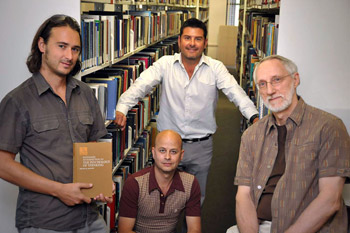Undergrads to get hands-on scientific experience in law and crime

The forensic psychology group at UBC Okanagan includes, from left, psychology professors Michael Woodworth, Zach Walsh, Stephen Porter and Jan Cioe.
It’s unique in Canada, and the start of even bigger things to come. A brand-new honours certificate program at UBC Okanagan will soon give top psychology undergraduate students the opportunity to concentrate their studies in forensic psychology.
“The science and application of psychology to the legal system, or psychology and law, is a rapidly developing area of psychological science, and one with the potential to greatly benefit society,” says forensic psychologist Stephen Porter, a new UBC Okanagan psychology professor who will direct the program in the first year.
“This is the only program of its type in Canada,” says Porter. “Undergrad students will have an incredible opportunity to learn about psychology and law through their research projects, as well as by working with forensic psychologists and other staff directly with the populations of interest — offenders and victims of crime.”
In addition to Porter, psychology faculty members Jan Cioe, Michael Woodworth, and Zach Walsh, helped design and will coordinate the program. Pending Senate approval this fall, the Honours Program with a Certificate in Forensic Psychology can begin accepting students who are currently enrolled in UBC Okanagan’s Bachelor of Science and Bachelor of Arts psychology programs.
“It’s pretty exciting,” says Porter. “Our first practica are already set up. Students will be working with agencies that integrate offenders back in society, such as the John Howard Society, Kelowna Community Corrections and the Elizabeth Fry Society, where they will work with women who come into contact with the legal system.”
By next year, the plan is to have practicum sites with a focus on victims of crime, such as victim services and a local sexual assault centre.
“It is an amazing opportunity for undergraduates,” Porter says. “They get to conduct their research thesis in the area of psychology and law, and concurrent with doing their research projects, they go out and work with psychologists and other professionals who do assessment and treatment with forensic populations.”
Jan Cioe, associate professor of psychology, says UBC Okanagan’s psychology program offers students a strong and dynamic foundation for advanced training that can lead to diverse career opportunities in psychology or numerous other professions.
“The added practical experience that the Forensic Certificate offers will give students a real advantage by giving them a clearer understanding of the nature of forensic work and it demonstrates that they have personal qualities to function in an applied context,” says Cioe. “Our goal is to ensure that our graduates are maximally prepared to succeed in grad school — this new certificate does that for our very best students.”
Porter believes the greater forensic community will also reap the rewards of UBC Okanagan’s undergrad psychology program.
“Given that we are emphasizing an evidence-based practice, and that our students will be bringing their scientific knowledge to practical settings, this program is sure to benefit relevant professionals and forensic populations,” says Porter. “And, ultimately, we believe society as a whole will benefit from improved practice in a legal setting.”
Much more forensic psychology to come
Establishing a Forensic Certificate program is the first step towards creating what Stephen Porter and colleagues hope will become the development of a PhD specialization in forensic psychology at UBC Okanagan.
Although the process may take a couple of years, Porter expects doctoral students will soon have the opportunity to specialize in experimental or clinical forensic psychology. The Psychology Department currently has a PhD experimental psychology program and recently hired two new clinical psychologists, Zach Walsh and Susan Holtzmann, to contribute to the development of an accredited PhD clinical psychology program.
“There is enthusiasm and commitment at every level at UBC Okanagan to support our initiatives in psychology and law,” he says, crediting Cynthia Mathieson, Acting Dean of the Irving K. Barber School of Arts and Science, and Provost Alaa Abd-El-Aziz for their direct support.
Working with psychology professors Michael Woodworth and Zach Walsh, Porter is spearheading and seeking major funding for a UBC Okanagan Centre for the Study of Psychology and Law. The vision is for a state-of-the-art, world-class research facility in which the team will conduct cutting-edge studies with relevance to the legal system, on topics such as criminal behaviour, victim psychology, eyewitness memory, and deception detection.
— 30 —